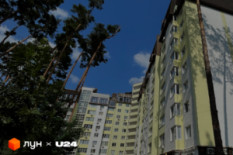The sincere personal responsibility of the Swiss towards society and their involvement in volunteering at various levels are the most striking features of the Swiss mentality. What is the secret of this commitment? Where is the button that triggers civic and political responsibility, and how can we transfer this to Ukrainian society? Many Ukrainians living in Switzerland are asking themselves these questions.
We have written a lot about proactive Ukrainian associations - responsible, determined, committed and unbreakable. But it was a response to a challenge, a movement from bad to better. Today, Ukrainians are facing the task of further conscious development in the field of sustainable development of volunteer initiatives and the formation of a responsible society at various levels. Analysing the Swiss experience, its further adaptation and integration is the way to go.
In search of a "responsibility button", we initiated a meeting with Yannick Morand, Deputy Director of the Fondation Compétences Bénévoles, whose activities are the clear demonstration of the deep roots of civic responsibility and the need for voluntary involvement in socially significant processes.
Our meeting took place in the new comfortable office of the foundation in a very warm atmosphere. Mr Yannick personally made coffee and made sure I was comfortable, he was very sincere and friendly.
We talked about the long tradition of volunteering in Switzerland, which is embodied, among other things, in the activities of the Foundation headed by Yannik. In particular, we talked about the unique phenomenon of the Swiss militia system, which touches almost all components of the state system and civil society. Understanding the essence of this system can be the key that will open the door to understanding the "Swiss code" - a responsible citizen whose basic needs include the desire to help.
What is this system?
The term comes from the Latin militia (army), although Ukrainians are used to a different meaning of this word, which was synonymous with the word "police" in Soviet times. The police system in Switzerland started with the original concept of the army. This approach is based on the principle of compulsory military service and arming the population, instead of forming and maintaining a standing army. Later, municipalities and local administrations began to apply this approach. In this case, citizens were temporarily given positions (even important ones, such as mayor) in the system of state power and performed their duties on a voluntary basis or for a symbolic fee. Eventually, the militia system became entrenched in all levels of Swiss political and institutional life.
The main idea behind Switzerland's militia system is that since citizens make up the state, they not only have the right to vote and elect their representatives, but also have to assume obligations and responsibilities.
Over time, the militia principle has become integrated into all areas of Swiss life. Almost every citizen has experience of regular volunteering and is a member of various associations and foundations.
Volunteering at this level and the existence of a large number of associations naturally leads to the emergence of a kind of "superstructure", a level up in the volunteering system, which focuses on helping those who help. We are talking about volunteer foundations that support volunteer associations. One such foundation is the Fondation Compétences Bénévole, which is the subject of this article.
As stated on the Foundation's website, its activities are based on the values of solidarity, trust and high standards, which form the goals, including the promotion of skills transfer and exchange of best practices, support for organisations, promotion of personal responsibility of citizens, etc.
Therefore, the conversation with Yannick Morand focused on two key issues: the main principles of volunteering in Switzerland and the uniqueness of the Foundation he heads.
The first question concerns the culture of volunteering in Switzerland. Please tell us about it.
There is a great culture of volunteering in Switzerland. Many people are involved in various associations, both locally and regionally. In particular, we have this concept of volunteers. For example, in Switzerland, there are very few professional firefighters, but every village has volunteer firefighters. This is also a more or less voluntary form of commitment that allows certain institutions to function.
Could you tell us about the activities of the Fondation Compétence bénévole?
The Fondation de Compétences Bénévoles has been existing for 15 years, and our goal is to help non-profit organisations launching key projects. We do not offer money, we offer competences.

How does it work?
If an association or foundation wants to set up cost accounting, define a communication strategy, or better organise its internal processes, for example, but does not have the skills to do so, they can turn to the services of Fondation Compétence bénévole. We have a network of 230 volunteer experts in French-speaking Switzerland, each with specific skills that can help an association, and this help is completely free of charge.
The selection criterion for receiving expert advice from volunteers is that they are non-profit organisations, usually working in the fields of health, sport, environment and culture, as well as social work, and are active in the French-speaking part of Switzerland.
The Foundation has four offices, in Nyon, Geneva, Fribourg and Sion and five part-time employees.
Are there any membership fees? How is this structure financed?
The Fondation Compétences Bénévoles is recognised as a non-profit organisation and is funded by one third by cantons and municipalities and two thirds by private companies and individuals. And for now, we offer our services free of charge. We do not ask for anything in return, we do not require membership, so our beneficiaries do not pay any membership fees.
But it is true that membership fees are the main source of income for many small associations in Switzerland. They provide a constant income.
Okay, and if we take a specific example of our media project. We have created an association called Connection Media in Geneva, and, for example, we are looking for partnerships for our project. What kind of help can we ask you for?
Our foundation can help associations create a kind of funding dossier. This will make it easier to find partners. We don't offer you direct contacts with sponsors, but we can help you identify what services you need. For example, we can offer to put together a package aimed specifically at donor funds or companies.
Can you outline the algorithm for a potential beneficiary?
In general, we work like this:
- A non-profit organisation that wants to start a project makes a request.
- If the organisation meets our criteria, which I mentioned above, it prepares a dossier.
- The application is then submitted to the Selection Committee, which evaluates the request. The committee members conduct a detailed analysis of the project to determine whether the non-profit organisation is eligible for support.
- If the Committee gives the green light, it determines the volunteer's profile and the terms of cooperation.
- The Foundation then turns to its network of volunteers and looks for those who are best suited to support this particular association.
- Once a volunteer is identified, the cooperation begins - the expert volunteer transfers competences, know-how and methodological tools, etc. The Compétences Bénévoles Foundation provides regular support.
- At the end of the project, the cooperation is evaluated in the presence of the 3 parties involved.

As a result, strengthened in the long term by the assistance of our Foundation, the association continues its active work.
In Switzerland, there are many associations with very different and unexpected concepts. Can you tell us about something extraordinary from your experience?
What comes to mind? There are many projects. For example, we came to the aid of one project called the “Four banal”. This is an old kitchen oven where bread is baked in the traditional Welsh way, as it was 100-150 years ago. The whole community gathers around this communal oven. A community or association maintains the oven and organises events around it. It's about community and the power of tradition.
And in the canton of Valais, in the town of Leuk, there is an association called Treffpunkt Tschüdanga, created by Jennifer Skolowski. It's a place where people, nature and animals meet. It's a kind of theatre in the middle of nature. There's a garden, animals, circus performances, an open-air kindergarten for children, etc. So, it's a place that brings together all sorts of wonderful things and, above all, unites people from different backgrounds. These can be migrants, the elderly, people with disabilities or various illnesses, children of all ages. In fact, anyone can take part in the association's workshops.
And these projects involve more than 200 volunteers from various fields, based on an internal need to help, which is shaped by the desire to be in solidarity and is based on the long tradition of volunteering in Switzerland. This is really impressive.
And I am sure that the Swiss experience is very valuable for Ukraine, where a powerful volunteer movement has once again developed at all levels. We must do everything to make volunteering a sustainable tradition in our country in the long run, so that foundations like yours can emerge. And the whole volunteer movement turned into an effective and sustainable structure.
Thank you, Yannick, for this interesting conversation.
Reflections after the conversation:
The history of the formation of a responsible society in Switzerland shows that compulsory military service and the right (and duty) of every citizen to defend the country at the slightest threat are the cornerstone of personal responsibility. In Ukraine, there is currently a heated debate on the issue of gun ownership, and there is a lack of readiness for such changes at both the state and societal levels. However, in the context of the major war and the experience of the volunteer movement, which became the basis of resistance to the invader, we should reconsider our views.
In addition, the history of Ukraine had the experience of the Cossacks and the Cossack State, which could have become the basis of the Ukrainian police system, but unfortunately, this movement was interrupted by the same aggressor that is now attacking our country. However, there are good news: the Cossacks are inscribed in our DNA, which is seen in the ability to self-defence against external and internal threats (remember the Maidan). Therefore, we can consciously rely on this internal code, restore it in ourselves and make it the basis for further growth. And the challenges of today are the incentive that will help accelerate our movement towards a responsible society and the formation of a responsible citizen.







